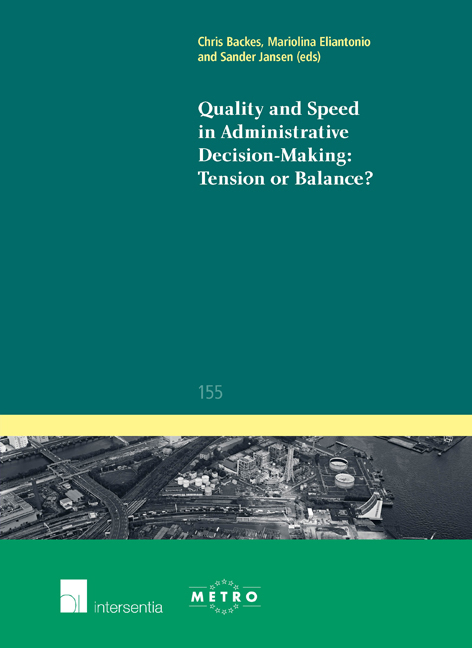Book contents
- Frontmatter
- Contents
- List of Authors
- List of Abbreviations
- Introduction
- Quality and Speed in Administrative Decision-Making: A German Case Study
- The Quest for Quality and Speed in Italian Administrative Law Or the Tale of some Elusive Targets
- Quality and Speed in Administrative Decision-Making: A French Case Study
- Planning for Major Infrastructure in England: Front-Loading Participation in the Interests of Efficiency
- Quality and speed in Judicial Procedures and Administrative Decision-Making: Environmental Permits in Sweden
- Faster and Better!? Decision-Making in the Netherlands
- Conclusions
- Ius Commune Europaeum
Introduction
Published online by Cambridge University Press: 12 December 2017
- Frontmatter
- Contents
- List of Authors
- List of Abbreviations
- Introduction
- Quality and Speed in Administrative Decision-Making: A German Case Study
- The Quest for Quality and Speed in Italian Administrative Law Or the Tale of some Elusive Targets
- Quality and Speed in Administrative Decision-Making: A French Case Study
- Planning for Major Infrastructure in England: Front-Loading Participation in the Interests of Efficiency
- Quality and speed in Judicial Procedures and Administrative Decision-Making: Environmental Permits in Sweden
- Faster and Better!? Decision-Making in the Netherlands
- Conclusions
- Ius Commune Europaeum
Summary
The economic crisis that afflicted Europe in 2008 has been considered a major hindrance to investments and development in many EU countries. While in 2016 the situation is not as dire as a few years back, the effects are still very much present in today's EU economy. In various European countries (such as France, Italy, or the Netherlands), lawmakers have adopted legislation in order to deal with the consequences of the crisis. These laws contain provisions that are aimed at speeding up administrative decision-making and judicial proceedings and which therefore have an impact on various provisions of general administrative law. Along with the aim of facing the economic crisis, measures to speed up decision-making and judicial proceedings have also been taken to make administrative law more up-todate and enable it to meet the needs of current society.
However, the need for speedier decision-making and judicial proceedings and the consequent acceleration mechanisms may clash with the need to preserve the quality of these proceedings. On the one hand, swift procedures can be considered as one aspect of quality of decision-making. On the other hand, other aspects of quality, like public participation and thoroughly weighing all relevant aspects and interests, may come under pressure when speed of decision-making is the only focus of reforms. The question is thus where the balance between these two competing interests ought to be placed, and to what extent proceedings can be sped up without prejudice to their quality. Even better, perhaps there are ideas that both foster speed and a higher quality of decision-making at the same time. Furthermore, speeding up decision-making and judicial proceeding may run contrary to certain constitutional fundamental principles and values, such as the rule of law, the right of access to court and the right of defence. Last but not least, as legal systems do not operate in a legal vacuum, it important that acceleration reforms do not violate European and international standards.
This book presents six national perspectives on those issues, together with a comparative overview comparing and contrasting the national contributions on the need to find a balance between, on the one hand, the need to have faster administrative decisions and court rulings, and, on the other, the necessity to preserve and enhance the quality of administrative and judicial decisions.
- Type
- Chapter
- Information
- Publisher: IntersentiaPrint publication year: 2016
- 1
- Cited by

